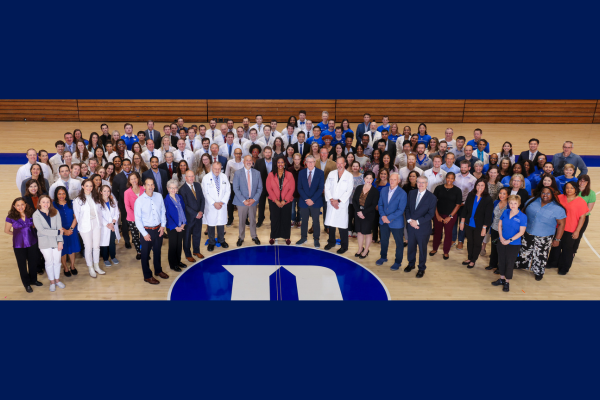Celebrating Our Physician Assistants
Please join me in recognizing, celebrating, and thanking our Physician Assistants (PAs) during National PA Week. Our PAs provide the highest quality care for our patients and community. Their contributions are a cornerstone of healthcare, especially in our department. We are grateful for their tireless work for our patients and our department.
2024 Annual State of the Department Spotlights Team Successes
The annual State of the Department event highlighted a year of new research, national and international accolades, innovative training, expert patient care, community outreach, and new partnerships. More than 1,000 clinicians, faculty, staff, students, and trainees worked together to achieve success.
Newsweek Ranks Duke in Top 25 Orthopaedic Hospitals Worldwide
Newsweek ranks specialty hospitals worldwide. I am delighted that Duke ranked in the top 25 this year for the first time! The ranking is determined by a survey in which orthopaedists worldwide recommend the best hospitals. It also factors in accreditation data and patient-reported outcome measures.
This is a testament to your great work, the stellar outcomes of our patients, and your international reputation!
Congratulations on this incredible recognition.
Celebrating Our Housekeeping and Environmental Services Team
Our environment is safe and clean due to the dozens of devoted caretakers who diligently keep our labs, clinical and surgical spaces, classrooms, and offices in order. Each day, this team upholds a standard of excellence that makes Duke shine figuratively and physically.
During International Housekeeping and Environmental Services Week, we are incredibly grateful for the daily efforts of each environmental caretaking team member serving our department.
September is Suicide Prevention Month
September is Suicide Prevention Month — a time to raise awareness of this urgently important crisis, to spread hope, and to share vital information about suicide prevention. Our goal is to ensure that individuals, friends, and families have access to the resources they need to discuss suicide prevention and seek help.
Honoring Memorial Day
While this day marks the unofficial start of summer and is often seen as a time for relaxation, let's take a moment to reflect on its deeper meaning. Memorial Day honors those who have perished while serving in our military. They sacrificed to uphold the values and ideals they fought for, striving for the greater good.
There are several veterans in our department. Please also join me in thanking the men and women who served in the military for putting their lives on the line and all those who care for them.
Celebrating Administrative Professionals Day
Today marks Administrative Professionals Day, a day first proclaimed by U.S. Secretary of Commerce Charles Sawyer in 1952 to recognize the invaluable contributions of administrative assistants and other administrative support professionals.
Meet Our Incoming PGY1 Residents
Click here to view a video introduction of our incoming PGY1 residents. They are a fantastic and accomplished group. Please join me in welcoming them to our Duke Orthopaedic team!
Celebrating National Occupational Therapy Month
April is National Occupational Therapy Month – a time to celebrate, acknowledge, and commend our provider and faculty’s exceptional clinical care, education, and research.






